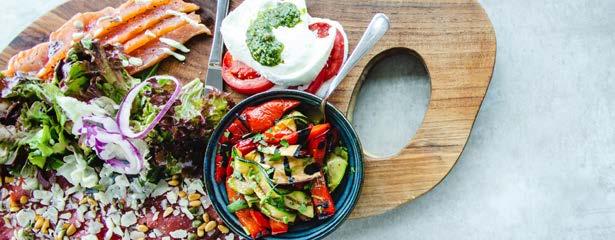

The Not-So-Radical Cancer Diet
 Dr. Kevin Conners, D.PSc.,
Dr. Kevin Conners, D.PSc.,
Why Strict Cancer Diets Can be Harmful

Strict dietary regimens for cancer patients are frequently advocated, particularly within the field of alternative medicine. You’ll often hear assertions like, ‘Every cancer patient should follow a particular, named diet,’ commonly referring to a Ketogenic diet, Gerson-type juicing diets, a raw food diet, or any other diet currently in vogue. While these dietary changes can indeed be beneficial for certain individuals with specific types of cancer, it’s important to exercise caution. Any claim suggesting that ‘everyone’ with a complex disease like cancer should adopt a specific approach should throw up some red flags to our common sense.
The truth is: Everyone is different; every cancer is different, and everyone should be treated uniquely. Cancer is a highly individualized disease. For instance, even if two sisters are diagnosed with breast cancer, the factors driving the growth of their cancers may vary greatly. Similarly, breast cancer is fundamentally different from prostate cancer or brain cancer; they’re different diseases. Even within the same type of cancer, the disease can manifest differently in different individuals. Hence, our dietary strategies for cancer patients need to be more personalized and specific. There’s no one-size-fits-all diet for cancer patients.

Why Strict Cancer Diets Can be Harmful (continued)

While I’d agree that it is generally advisable for all cancer patients to make healthy lifestyle changes like reducing their sugar intake, consuming more organic foods, and avoiding exposure to harmful chemicals such as pesticides and herbicides, testing should be done before making many more drastic suggestions.
Simply stated, cancer treatment cannot be reduced to a universal dietary recommendation. Let’s consider a scenario. Suppose my cancer primarily thrives on sugar (glucose), through the process known as glycolysis. If I follow a recommendation that ‘every cancer patient should drink 10 glasses of juice a day,’ and I consume vegetable juices made with carrots and other carbohydrate-dense vegetables, this could cause a spike in my blood glucose levels. Consequently, this could end up nourishing the cancer rather than inhibiting it. Thus, a strict dietary regimen that works for one person could potentially be harmful to another, depending on the energy sources of their respective cancers.
Additionally, it’s important to note that the fuel preferences of cancer cells can change over time. For example, a cancer might utilize glucose for a while, but when glucose is less abundant, the cancer cells could switch to using amino acids as their primary fuel, specifically glutamine or methionine. This adaptability underscores the potential danger of a one-size-fits-all dietary strategy. Without understanding what your specific cancer feeds on, a strict diet could inadvertently end up fueling the cancer.

Practical Advice for Cancer Patients
For someone diagnosed with cancer, a practical first step is to refine one’s diet. This may involve minimizing the intake of chemical preservatives, food colorings, additives, dyes, pesticides, and herbicides. Aim to incorporate more organic foods. Strive to consume foods in their natural, unprocessed forms, aligning with a whole food diet approach.
For instance, choose to eat actual vegetables instead of vegetable-based chips. Instead of opting for ready-made meals, cook your own using fresh, organic ingredients. If organic products aren’t readily accessible in your area, refer to the common ‘clean 15’ and ‘dirty dozen’ guide to select items with fewer preservatives, additives, and chemicals. This approach is beneficial for your body, regardless of whether your cancer is directly linked to these chemical contaminants or not. By reducing the intake of these substances, you ease the load on your liver and immune system, freeing them up to focus more effectively on combating cancer cells.


Certain Cancer Diets May Feed Your Cancer

Certain cancer diets may feed the cancer. For instance, a Ketogenic diet is going to be higher in animal proteins, higher in dairy, and lower in any carbohydrates, obviously, because you’re trying to get your body in a Ketogenic state. Well, that could be an appropriate diet for someone whose cancer is fed through the glucose/glycolysis pathway alone. But, even if that were true, be on the lookout for a change in fuel source.
The now abundance of amino acids may trigger a “switch” for the cancer to now feed through the methionine/glutamine pathway and a dietary change may be in order. So if you’ve chosen to take a strict dietary approach, make sure that you are monitoring your cancer through objective means (MRI, CT scans, PET scans, and/or tumor marker tests, or some an examination) in order to make sure that your diet isn’t feeding the cancer.

SECURE YOUR SPOT ON OUR EXCLUSIVE INTERACTIVE WEBINAR BELOW!

If your cancer continues to grow with whatever diet you’re on, change your diet so you are not inadvertently giving the cancer cells exactly what they need in order to survive and grow.
Why Simply Removing Certain Foods May Be Best

What is a cancer patient to do? While the desire in developing a diet for a person with cancer should revolve around eliminating what fuels the cancer, there may be a more sensible approach that the average person may follow with greater ease. A more effective strategy might be to identify the specific, current fuel source of the cancer, bearing in mind that this can change over time. If you don’t have access to such specific testing, make sure you are closely monitoring any indicators of cancer growth, as stated earlier, which could be influenced by your chosen diet.
Consider finding a practitioner who is skilled in testing to best come to such a reasonable, yet effective diet. I have tested those with cancer for decades, using alternative testing procedures that have been very effective for our members. I rarely recommend implementing a drastic dietary measure like a Ketogenic diet—which, while potentially effective at eliminating the cancer’s fuel source, is challenging to maintain and could detract significantly from a person’s quality of life. I have long believed that more specific testing offers a more tailored and sustainable plan.
For instance, if I discover that dairy is the primary driver of their cancer, we simply ask the member to eliminate it while sticking to a reasonable, organic, whole-food, low sugar diet. Dairy was just an example but any food group could potentially be a driver/fuel source of a growing cancer. Pork, red meat, glucose, histamines, glutamine, alcohol, and so forth are all potential culprits. I believe, while some may do well with strict dietary approaches, the best option for most is a reasonable approach that doesn’t steal the joy out of living. As in all things, it’s crucial to strike a balance.


Cancer Diet LIVE, Interactive Webinar
We’re thrilled to extend an exclusive invitation to the registrants of “Cancer Breakthroughs Summit” for a groundbreaking live and interactive webinar with Dr. Kevin Conners. Join us as we explore the fascinating, transformative realm of nutrition and its impact on health, specifically in the context of cancer.
You’re encouraged to bring your burning questions - this is your chance to get them answered by one of the leading experts in the field.

Dr. Kevin Conners is the Clinic Director at Conners Clinic, an Alternative Cancer Coaching center. He graduated with his doctorate from Northwestern Health Sciences University in 1986 and has been studying alternative cancer care for over 25 years. He also holds AMA Fellowships and Board Certifications in Anti-Aging Medicine, Regenerative and Functional Medicine, Botanical Medicine, and is Board Certified in Integrative Cancer Therapy.


